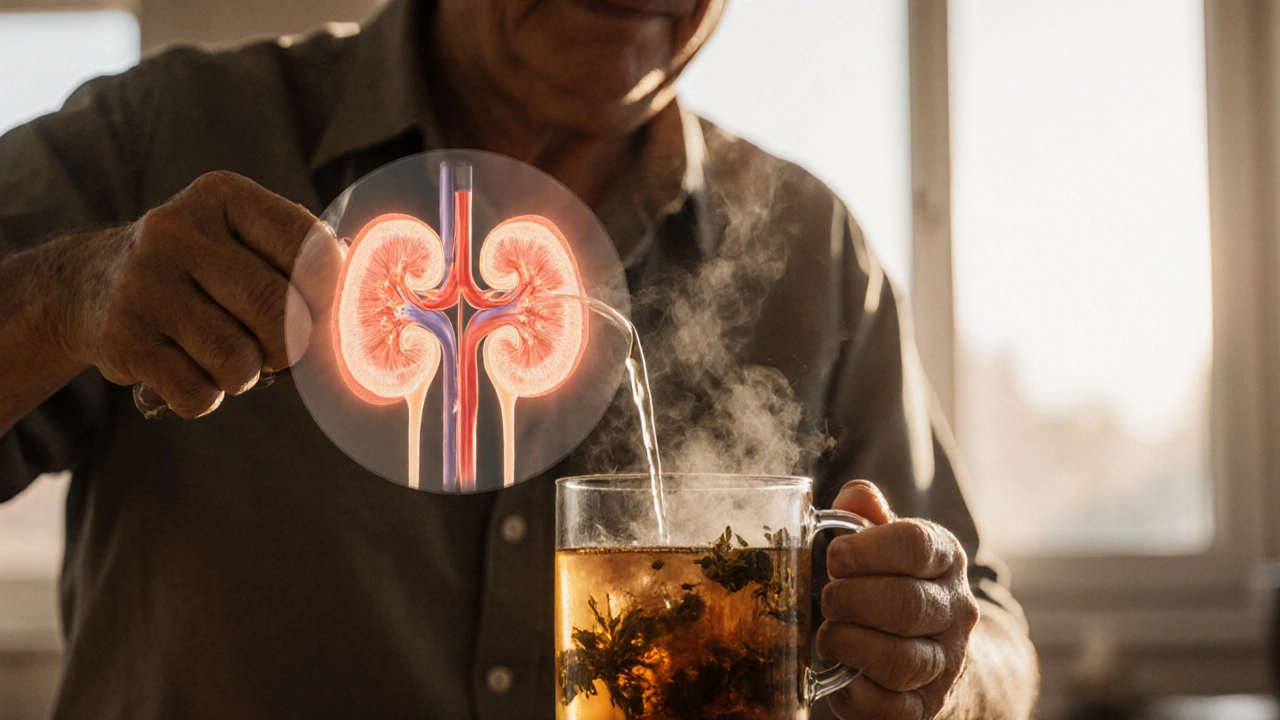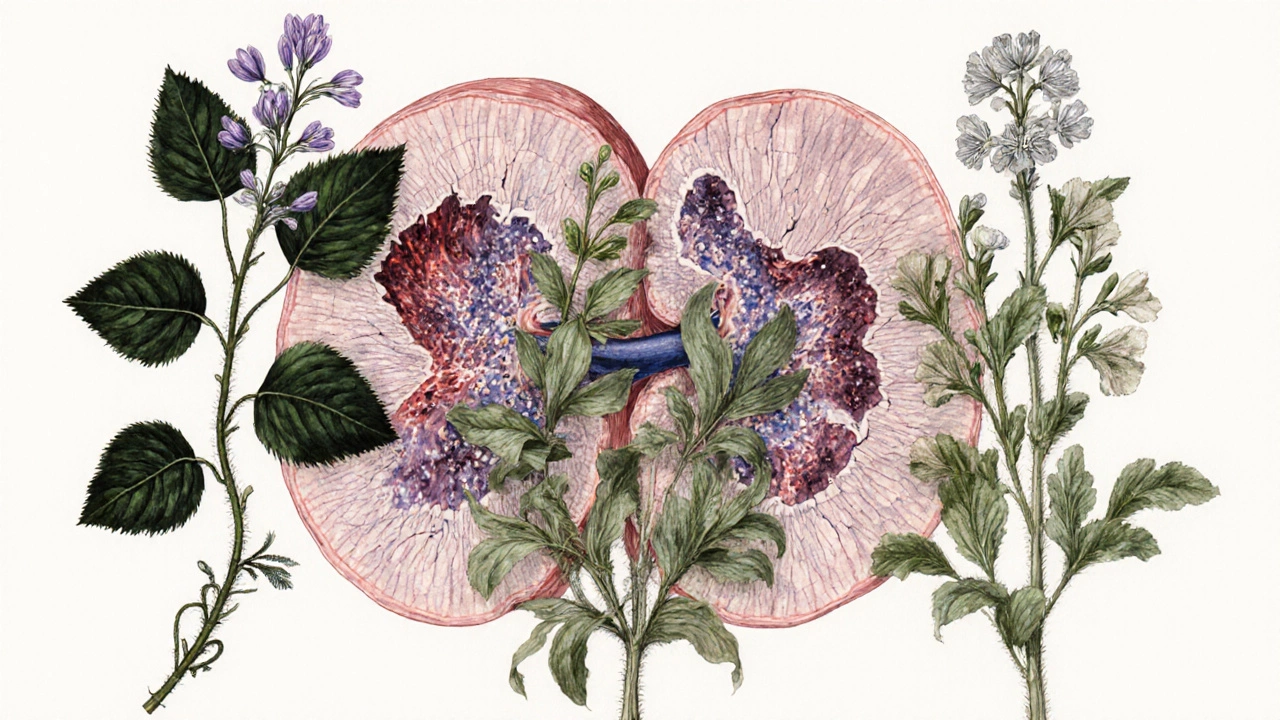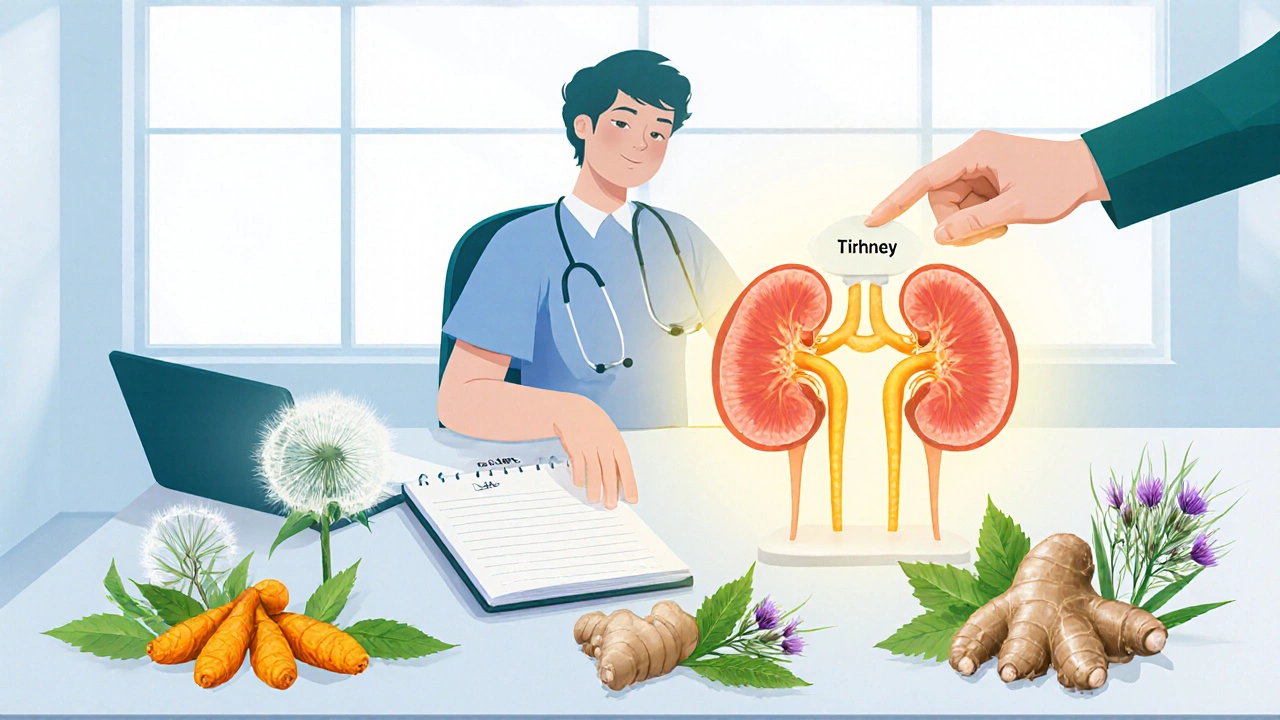
- Oct, 13 2025
- 0
Key Takeaways
- Some common herbs can cause direct kidney injury or worsen existing kidney disease.
- Aristolochia, comfrey, and pennyroyal are among the most dangerous.
- Watch for symptoms like swelling, changes in urine, and high blood pressure when using any herb.
- Always tell your doctor about herbal supplements, especially if you have kidney problems.
- Safer alternatives exist for most uses; choose them wisely.
When you start hearing about herbs bad for kidneys, the first thought is often, “I’m fine, I’ll just take a little tea.” The truth is kidneys are delicate filters, and a handful of popular herbs can actually damage them over time. This guide breaks down why certain herbs are risky, which ones to avoid, and how to keep your renal health safe while still enjoying the benefits of botanicals.
Kidney is a pair of bean‑shaped organs that filter waste, balance electrolytes, and regulate blood pressure. When kidney function declines, toxins linger, blood pressure spikes, and fluid builds up, creating a cascade of health problems. Understanding what can hurt these organs is the first step toward protecting them.
How the Kidneys Work and Why They’re Vulnerable
The kidneys receive roughly 20% of cardiac output every minute. Tiny filters called nephrons extract waste particles, excess salts, and water, turning them into urine. This process depends on healthy blood flow, precise cellular signaling, and an intact tubular structure.
When an herb contains compounds that are directly toxic to kidney cells (nephrotoxicity) or that trigger inflammation, the nephrons can be damaged. Unlike skin or liver, the kidney’s ability to regenerate is limited, so repeated insults can lead to chronic kidney disease (CKD) or acute kidney injury (AKI).
Mechanisms Behind Herb‑Induced Kidney Damage
- Direct cellular toxicity: Certain alkaloids or glycosides bind to kidney cell membranes, causing cell death.
- Crystal formation: Some compounds precipitate in the tubules, forming obstructive stones.
- Immune‑mediated inflammation: Herbal constituents may act as haptens, prompting the immune system to attack kidney tissue.
- Hemodynamic changes: Herbs that raise blood pressure or cause vasoconstriction can reduce renal perfusion.
Top Herbs Known to Harm the Kidneys
Below is a concise list of the most widely reported nephrotoxic herbs. Each entry includes the active compound(s), typical usage, and the level of risk based on clinical case reports and toxicology studies.
| Herb | Active Compound(s) | Common Use | Risk Level | Typical Warning |
|---|---|---|---|---|
| Aristolochia | Aristolochic acids | Traditional Chinese medicine for pain and inflammation | High | Can cause irreversible interstitial fibrosis |
| Comfrey | Pyrrolizidine alkaloids | Topical poultices, herbal teas for digestive aid | High | Linked to hepatic and renal failure when ingested |
| Pennyroyal | Pulegone | Digestive aid, insect repellent, essential oil | High | Causes acute tubular necrosis at high doses |
| Aconitum (Monkshood) | Aconitine | Analgesic, traditional folk remedy | High | Nephrotoxic and cardiotoxic; lethal in small amounts |
| Chaparral | Nordihydroguaiaretic acid (NDGA) | Detox cleanse, anti‑inflammatory | Medium‑High | Associated with acute kidney injury and liver toxicity |
| St. John’s Wort | Hypericin, hyperforin | Depression, mood support | Medium | Can interact with drugs cleared by kidneys, worsening renal load |
| Ginseng (Panax) | Ginsenosides | Energy booster, immune support | Medium | High doses linked to increased blood pressure and proteinuria |
| Licorice Root | Glycyrrhizin | Digestive aid, cough syrup | Medium | Can cause sodium retention, hypertension, and secondary kidney stress |
| Yohimbine | Yohimbine alkaloid | Male sexual health, weight loss | Medium | Triggers renal vasoconstriction, raising risk of AKI |

Why These Herbs Are Especially Dangerous
Let’s zoom in on a few examples to see the chemistry in action.
- Aristolochia: Aristolochic acids form DNA adducts that lead to mutagenesis and scarring of the interstitial tissue. Even short courses have been linked to rapid kidney function decline.
- Comfrey: Pyrrolizidine alkaloids metabolize into reactive pyrroles that damage endothelial cells in glomeruli, causing bleeding and fibrosis.
- Pennyroyal: High concentrations of pulegone overwhelm the liver’s detox pathways, generating toxic metabolites that injure renal tubular cells directly.
Because the kidneys filter everything that reaches the bloodstream, even low‑level chronic exposure can add up. Patients with pre‑existing CKD are especially vulnerable because their baseline filtration is already compromised.
How to Spot the Red Flags
Not every herbal supplement will list every ingredient on the label, but here are practical clues to stay safe:
- Check the ingredient list: Look for Latin names like Aristolochia fangchi or common names such as “comfrey leaf.”
- Beware of “detox” blends: Products promising quick cleansing often contain high‑risk herbs like chaparral or pennyroyal.
- Watch dosage recommendations: If a product suggests taking milligrams of a potent alkaloid, it’s a red flag.
- Monitor your body: Swelling in ankles, foamy urine, or a sudden rise in blood pressure after starting a new herb should prompt a medical check.
- Ask your pharmacist or doctor: They have access to up‑to‑date interaction databases for herbal‑drug combinations.
Safer Herbal Alternatives
If you love the idea of natural remedies, many herbs are kidney‑friendly and still offer health benefits. Here are a few you can consider:
- Turmeric (Curcuma longa): Anti‑inflammatory without known nephrotoxicity; use with black pepper for absorption.
- Milk thistle (Silybum marianum): Supports liver health and is gentle on kidneys.
- Dandelion leaf: Mild diuretic that helps with fluid balance without damaging renal tissue.
- Ginger: Improves digestion and circulation; safe at culinary doses.
- Raspberry leaf: Often used in pregnancy teas; not linked to renal issues.
Remember, “natural” doesn’t automatically mean “harmless.” Always verify the herb’s safety profile, especially if you have kidney disease.

Practical Steps to Protect Your Kidneys While Using Herbs
- Get a baseline kidney test: Serum creatinine and eGFR give you a starting point.
- Document every supplement: Keep a simple spreadsheet with herb name, dose, and start date.
- Limit duration: Even safe herbs should not be taken continuously for months without a break.
- Stay hydrated: Adequate water helps the kidneys flush out metabolites.
- Review annually with your nephrologist: They can interpret lab trends and advise on safe herb use.
When to Seek Medical Help
If you notice any of the following after starting an herb, contact a healthcare professional right away:
- Sudden swelling in legs or face
- Dark, tea‑colored urine or blood in urine
- Rapid weight gain (fluid retention)
- Persistent fatigue with nausea
- Unexplained rise in blood pressure
Early intervention can prevent permanent damage.
Frequently Asked Questions
Can occasional use of a harmful herb still cause kidney damage?
Yes. Some nephrotoxic compounds accumulate in kidney tissue even after a single high‑dose exposure. For people with pre‑existing CKD, even brief use can trigger an acute flare‑up.
Is it safe to use herbal teas if I have stage 3 kidney disease?
Only if the tea contains well‑studied, low‑risk herbs like ginger, chamomile, or peppermint. Avoid blends that list aristolochia, comfrey, or other high‑risk botanicals. Always check with your nephrologist before adding any new brew.
Do over‑the‑counter herbal supplements undergo safety testing?
In most countries, supplements are regulated as foods, not drugs, so they bypass rigorous safety trials. Manufacturers must list ingredients but are not required to prove they’re safe for kidney patients.
Can herbal extracts interact with prescription kidney meds?
Absolutely. For instance, St.John’s Wort can induce enzymes that speed up the clearance of certain diuretics, reducing their effectiveness. Licorice can raise blood pressure, counteracting antihypertensive drugs that protect kidney function.
What should I do if I suspect an herb caused kidney pain?
Stop the herb immediately, increase fluid intake if you’re not fluid‑restricted, and schedule an urgent lab panel (creatinine, eGFR, urinalysis). Bring the product label to your doctor for precise identification.
Bottom line: herbs can be powerful allies, but they’re also capable of hurting the very organ that keeps you healthy. By knowing which botanicals pose a risk, tracking what you take, and staying in touch with your healthcare team, you can enjoy the benefits of nature without compromising kidney function.
Nikhil Verma
I'm a dedicated physician with a passion for exploring the intricacies of medicine, focusing on the unique healthcare challenges in India. I spend much of my spare time writing articles aimed at improving public understanding of health issues. Balancing my clinical practice and writing allows me to reach a wider audience, sharing insights and fostering a deeper appreciation for medical advancements. I derive immense satisfaction from both treating patients and engaging with readers through my writing.